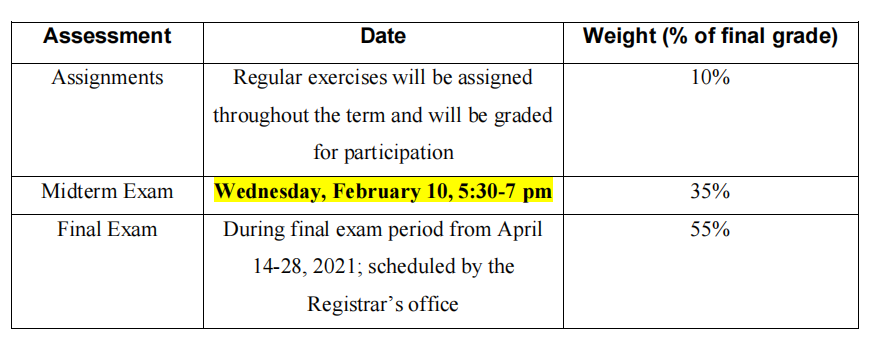Intermediate Microeconomic Theory II
AP/ECON 2350
微观经济学理论代写 Moodle (on eclass) and Zoom will be the two main platforms through which students will interact with the course materials, the instructor and…
COURSE OUTLINE
- Course Instructor: Sudeshna Maitra
- Email: [email protected]
- Phone: TBA
- Office Hours: On Zoom, by email appointment
(Zoom link available on the course website)
- Teaching Assistant: TBA
2.Course Website: https://eclass.yorku.ca/eclass/course/view.php?id=35008 (Section T)
3.Technical Requirements for taking the course: 微观经济学理论代写
Moodle (on eclass) and Zoom will be the two main platforms through which students will interact with the course materials, the instructor and the teaching assistant. Please review this syllabus to determine how office hours, tests and presentations will be conducted.
The following points about online meetings should be noted:
- Zoom is hosted on servers in the U.S. This includes recordings done through Zoom.
- If you have privacy concerns about your data, provide only your first name or a nickname when you join a session.
- The system is configured in a way that all participants are automatically notified when a session is being recorded. In other words, a session cannot be recorded without your knowing about it.
Please review the technology requirements and FAQs for Moodle.
Here are some useful links for student computing information, resources and help:
Student Guide to Moodle
Zoom@YorkU Best Practices
Zoom@YorkU User Reference Guide
Computing for Students Website
Student Guide to eLearning at York University
To determine Internet connection and speed, there are online tests, such as Speedtest, that can be run.
-
Times and Locations 微观经济学理论代写
Please note that this is a course that depends on remote teaching and learning. There will be no in-person interactions or activities on campus. Furthermore, there will be NO LIVE LECTURES for this course. You can study the material asynchronously, i.e. in your own time. However, ALL EXAMS WILL BE HELD SYNCHRONOUSLY, i.e. you will have to write them at the prespecified time announced in the course outline.
I am here to help you understand the material and solve assignments. Please email me whenever you have questions or would like to meet in a live session on Zoom.
Pre-recorded lectures: Every week, all new pre-recorded lectures, exercises, and other relevant material will be posted on the Moodle site by 4:00 pm on Friday. Please check regularly for new content.
Office hours (on Zoom): Please email the instructor ([email protected]) to make a private one-on-one appointment to meet with the instructor.
(The Zoom link for office hours is available on the course website.)
-
Course Description
Introduction
This is the second half of a course in Microeconomic Theory. It provides a natural continuation of the material covered in Econ 2300.
Textbook
Intermediate Microeconomics with Calculus, by Hal R. Varian (First Edition), W.W. Norton & Company (ISBN: 978-0-393-68993-8)
The textbook is available in the bookstore. Copies of the workbook that accompanies this text are available but not required. It is important to practise doing microeconomics by solving problems. There are many such problems in the workbook. You might think about sharing a copy of the workbook with one or more of your classmates.
Details: Course content and how to succeed! 微观经济学理论代写
The course will follow the content of the text from Chapter 15 through Chapter 33 (as time permits).
The course content will be delivered in pre-recorded videos that will be posted on the course website every Thursday – you are required to watch and review this material on your own in your own time (i.e. asynchronously).
For success in this course it is recommended that you:
- Stay up to date with course material and problems that are posted online week by week
- Email the instructor with any difficulties you have in understanding the course material
- Email the instructor to set up one-on-one office hours on Zoom to go over any material you do not follow well
- 3 Do (2) and (3) above as soon as you face difficulties – do not let your questions build up!
Topics 微观经济学理论代写
We will cover the course material in the following order:
- Theory of Producer Behaviour, Market Demand and Supply: We begin in Chapter 19 with a discussion of the technical properties of production functions. In Chapters 20 and 21 we develop the theory of how a firm operates to be cost efficient: that is, how a firm supplies any amount of output at least cost. Chapters 19 and 22 deal with the next problem of exactly what output level a firm should supply. We assume that firms are price takers and profit maximizers in addition to being cost minimizers. We examine the short and long run properties of the market equilibrium that arises when individual firms are price takers (Chapters 23, 24). At the same time, we cover the material in Chapters 15 and 16 on traditional demand and supply analysis when all agents are price takers.
- Monopoly: Monopoly involves a situation where there is only one supplier of a good or service. This agent can control price and is thus a price setter (or, equivalently, a quantity setter). In Chapters 25 and 26 we examine the details of how monopolies may arise and the variety of ways that they may choose to set prices.
-
Oligopoly: Oligopoly (Chapter 28) involves a situation somewhere between perfect competition and monopoly. There is more than one seller but not enough sellers to reasonably suppose that they are price takers. The firms in the market recognize that they are mutually interdependent. We examine ways in which market equilibrium may arise when interdependence is present.
- General Equilibrium: In this topic we consider how all markets simultaneously clear so that there is equilibrium for all agents in all markets. This is a difficult topic but very important for the formulation of economic policy. We begin in Chapter 32 with a discussion of general equilibrium for exchange economies. We then move on to the more general case of production and exchange in Chapter 33. Some welfare issues are examined in Chapter 33.
- Game Theory: We finish the course with a discussion of one of the most important current areas of research in economics. Many important economics results can be obtained by characterizing problems as ‘games.’ The material we will cover is contained in Chapters 2, 29 and 30.
-
Grades:

- All assignments and exams will be held on the course website (eclass) and will be openbook assessments.
- There will be no makeup exams. PLEASE NOTE THE DATE AND TIME OF THE MIDTERM EXAM!
- The final grade will be determined by the higher of the following 2 calculations:
o 10% assignments + 35% midterm + 55% final
o 10% assignments + 90% final
-
Academic honesty and integrity:
In this course, we strive to maintain academic integrity to the highest extent possible. Please familiarize yourself with the meaning of academic integrity by completing SPARK’s Academic Integrity module at the beginning of the course. Breaches of academic integrity range from cheating to plagiarism (i.e., the improper crediting of another’s work, the representation of another’s ideas as your own, etc.). All instances of academic dishonesty in this course will be reported to the appropriate university authorities and can be punishable according to the Senate Policy on Academic Honesty.
- Important Dates: https://registrar.yorku.ca/enrol/dates/fw20
-
General Information 微观经济学理论代写
IMPORTANT COURSE INFORMATION
Final course grades given by the instructor will use the standard York grading scale and may be adjusted to conform to Program or Faculty grades distribution profiles.
All students are expected to familiarize themselves with the following information, available on the Senate Committee on Curriculum & Academic Standards webpage; http://secretariat-policies.info.yorku.ca
- Senate Policy on Academic Honesty and the Academic Integrity Website
https://secretariat-policies.info.yorku.ca/policies/academic-honesty-senate-policy-on/
- Ethics Review Process for research involving human participants
https://secretariat-policies.info.yorku.ca/policies/ethics-review-process-for-research-involving
human-participants-policy/
- Academic Accommodation for Students with Disabilities (Policy)
https://secretariat-policies.info.yorku.ca/policies/academic-accommodation-for-students-withdisabilities-policy/
- Student Conduct Standards
http://www.yorku.ca/oscr/standards.html
- Religious Observance Accommodation
https://secretariat-policies.info.yorku.ca/policies/academic-accommodation-for-students-religious-observances-policy-guidelines-and-procedures/
- Religious Observances Dates
https://registrar.yorku.ca/enrol/dates/religious-accommodation-guidelines-2020-2021
- Grading Scheme and Feedback (Senate) Policy
http://secretariat-policies.info.yorku.ca/policies/grading-scheme-and-feedback-policy/
- Important Sessional Dates
https://registrar.yorku.ca/enrol/dates




